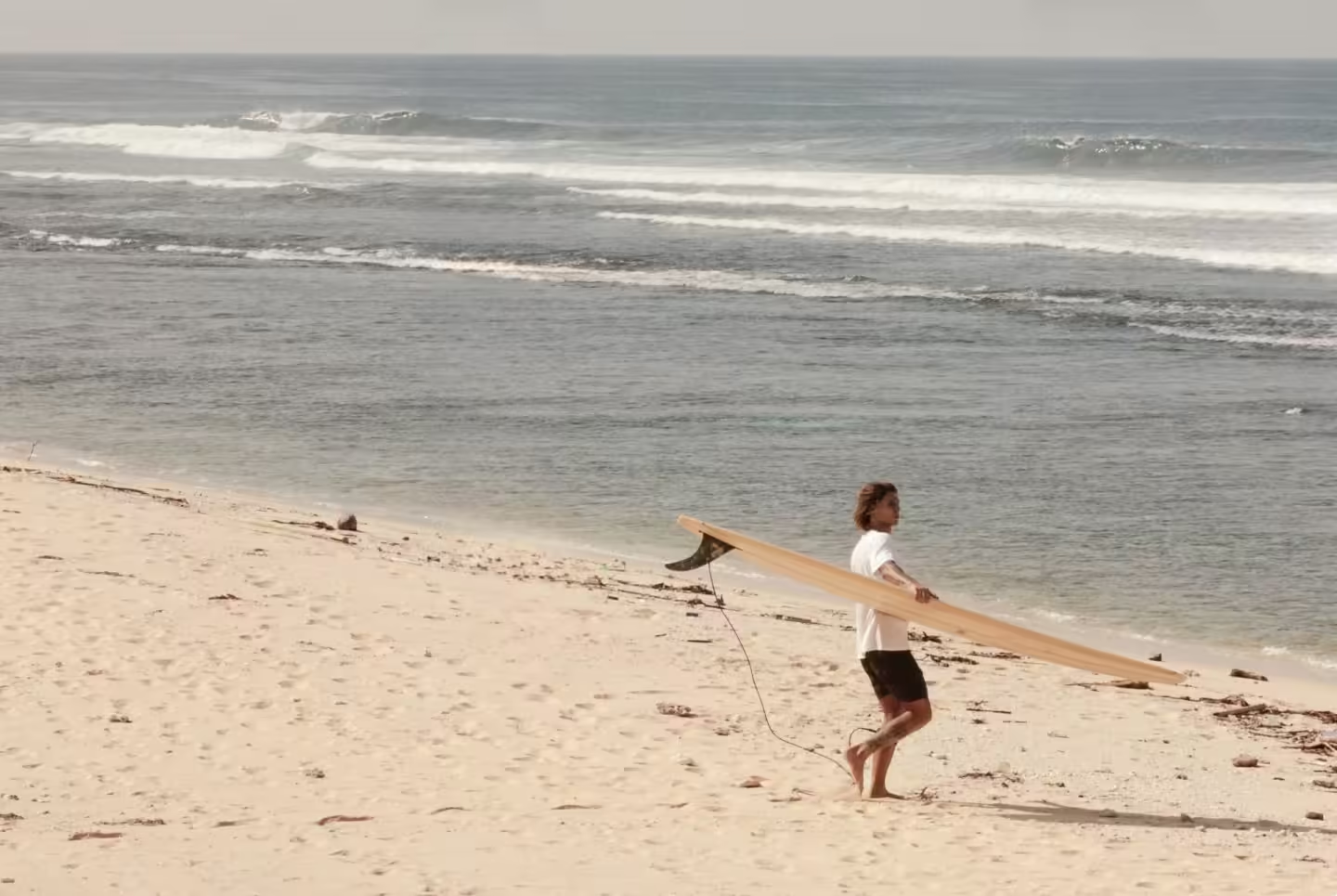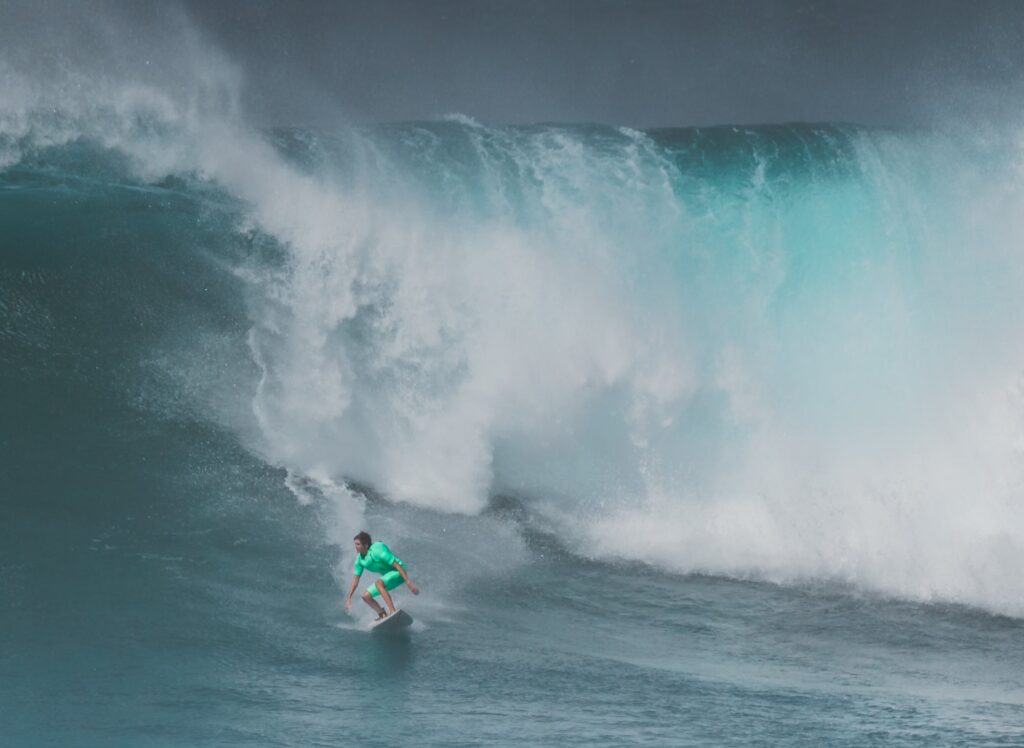How to Overcome Fear of Surfing
Are you worried about being stranded in deep water, swallowed up by a closeout, or getting crashed by waves? Are you anxious when you see a swell coming to you?
It’s natural to feel a sense of fear when you’re about to surf (especially for the first time). After all, the ocean is a big, powerful place and it’s easy to understand why some people might be hesitant to get in the water.
Surfing can be a daunting activity, mostly due to its ever-changing environment of it. Most other sports have set boundaries, whereas, in surfing, the playing field is constantly changing, and also ー there are no explicit rules as they’re all unwritten.
Not to mention, surfing takes place in the ocean – an intimidating and powerful environment that lies outside of most people’s comfort zone.
However, with a bit of preparation and practice, it’s possible to overcome your fear of surfing and start enjoying this exhilarating sport.
Let’s start by breaking down some of the most common fears associated with surfing.
Fear of Deep Water
One of the most common fears people have when it comes to surfing is the fear of deep water.
When you’re out in the lineup, you’re surrounded by vast amounts of open water and it can be easy to feel overwhelmed.
I believe you already thought it before, but imagine yourself away from shore, without the ability to stand on the ground – that can be really scary.
The good news is, you don’t have to go far out to deep water to catch waves. In fact, most of the time you’ll be surfing in relatively shallow water. As long as you’re comfortable paddling further in deep water, you’ll be fine when surfing.
This is a perfectly normal feeling, but there are a few things you can do to help ease your anxiety.
First, it’s important to remember that you’re not alone out there. In most surf spots, there are always other surfers around you and if you get into trouble or have a bad feeling, someone will be there to help.
Important to mention that in order to overcome the fear of surfing, you should always surf with a friend or group, this will increase your sense of safety.
It’s helpful to know your limits and only paddle out as far as you’re comfortable with. There’s no shame in staying close to shore – in fact, depending on the location, it’s often the best place to catch waves anyway.
Second, try to stay calm and focus on your breathing. If you start to feel panicky, take a few deep breaths and remind yourself that you’re safe.
The more you struggle, the more exhausted you will be and the more scared you’ll feel, resulting in higher anxiety levels.
Sit on your board, watch the waves, stay in a shallow area and listen to nature. If it’s still too much to handle, just get back to shore, it’s all good.
Try to keep cool and don’t fight the waves, and if you start to feel like you’re losing control, relax and let the wave carry you.
Fear of Rip Currents And Tides
Another fear that is common among beginning surfers is the fear of rip currents and tides.
A rip current is a narrow, fast-moving channel of water that starts near the shore and extends out into the ocean. These currents can be dangerous if you’re not careful or don’t know how to read them.
And then there are tides, which are the rise and fall of sea levels due to the gravitational pull of the moon and sun. Depending on the location, tides can have a significant effect on the size and shape of waves.
These can also create dangerous conditions for surfers, especially if you’re not aware of how to read each of them.
Rip currents are more common at steep-sloping beaches with big waves, so it is best to find a flat beach with gentle, crumbling waves when learning to surf.
You don’t want to find yourself fighting rip currents, or you’ll be exhausted by trying to get out of it, which can be more frightening.
If you find yourself fighting a current that is pulling you out to sea, you then must paddle yourself parallel to the shore until the water calms, and only then you can paddle back to the shore (or ride your way).
In order to overcome the fear of rip currents and tides, make sure that whenever you arrive at a new beach for a session, it is advisable that you check with the lifeguards and ask about potential rip currents status and other hazards.
Fear of Big Waves
Another common fear people have when surfing is the fear of big waves. This is especially true for beginners who are just starting out.
Have you seen those massive waves in videos or on TV and felt like there’s no way you could ever surf something like that?
Well, it is true that big waves are what makes surfing an extreme sports genre, but it doesn’t mean you have to surf those. There are even pro surfers who don’t like surfing big waves.
If you do find yourself in a situation where you’re confronted with a big wave and don’t want to ride it, the best thing to do is to try duck diving.
If you haven’t practiced it yet (you definitely should), paddle in parallel to the shore and try to escape the breakpoint.
But the real good news is that you don’t have to start out by surfing big waves. There are plenty of smaller, gentler and gnarlier waves that are perfect for those who might fear big waves.
As you get more comfortable and confident in your abilities, you can gradually work your way up to bigger waves.
I can assure you you’d love surfing either when surfing big or smaller waves, and you will overcome your fear.
Fear of Being Wiped Out
Another common surfing fear is the fear of being wiped out. A wipeout is when you’re surfing and a wave breaks on top of you, pushing you under the water and tumbling you around.
Wipeouts can be scary, especially if you’re not used to swimming in the sea or if you’re surfing for the first time.
However, wipeouts are also a normal part of surfing and something that everyone goes through, even the best surfers in the world.
The key to overcoming this fear is to simply accept that wipeouts are going to happen and that unless you’re surfing all alone in some crazy spot, you’re going to be fine each time.
You might find yourself popping up after holding your breath for a while, but I gotta say it’s also part of the fun – it’s purely the feeling of the powerful ocean.
Fear of Marine Life
Another common fear that many surfers face is the fear of marine life. Sharks, in particular, can be a major source of anxiety for those who are new to surfing.
It’s important to remember that sharks are naturally curious creatures and most of the time they won’t even notice you in the water.
You will actually be surprised, but this is probably one of the most irrational fears in surfing.
Most people are aware of the common dangers in the ocean such as stingrays, jellyfish, and sea urchins.
However, what many don’t know is that they are much more likely to encounter these than sharks. And still, the main fear for some surfers comes from being attacked by a shark.
Many people believe that surfing is dangerous because of sharks, but this belief is mostly based on what we see in the media, TV, and movies.
The reality is that most surfers never see a shark while they are in the lineup, and fatal shark attacks are very rare.
Although it’s not a frequent occurrence, shark attacks always make headlines and evoke intense emotions in people.
It’s important to remember that the ocean isn’t our natural habitat – we’re not in control and we’re certainly not the top predators.
While some risk is inherent in surfing, there are certain ways to minimize some risks. For example, if you’re on a beach where stingrays might be present, shuffle your feet when entering the water.
Understand Your Fear
These were the most common fears that we’ve heard from different surfers. Now it’s key to understand what your fear is and how you can conquer it.
One of the first steps to overcoming your fear is to understand what causes it. Are you worried about being in the water? Getting thrown around by the waves? Or hurting yourself? Once you know what your fear is, you can start to address it.
One of the best ways to confront your fear is by reading up on surfing, watching videos, and educating yourself about how to stay safe in the water.
Knowing what to do in certain situations can be incredibly empowering and help you build confidence while in the lineup.
This fear is a natural reaction that comes from our deep reptilian brain. It is hardwired into us and controls our survival processes.
Although surfing has its dangers and sometimes fear is rational, there are also irrational aspects of fear which can have negative mental effects. It’s these downstream effects that hinder growth.
However, sometimes we need to override fear in order to accomplish something great. This may be something as simple as going for a job interview when you are scared of rejection, or as challenging as surfing in large waves when you are afraid of being hurt.
Here are five ways to further decrease your fear of surfing:
- Talk about the fear with family and friends – sharing experiences may help unlock the issue.
- Set a primary goal related to surfing. This could be something as simple as catching a wave, or riding a wave for more than 5 seconds.
- Choose a favorite beach – one that brings fond memories and is relatively quiet. This could be your home break or any beach where you feel comfortable surfing.
- Swim in waves without a surfboard in order to get used to tumbling surf and currents. Start off by swimming close to shore, and work your way out into deeper water as you become more comfortable. Remember to take your time, don’t push yourself too hard if you’re not ready yet, and always check the weather before going in.
- Focus on breathing – exercises such as yoga, and meditation are a way of learning how to overcome fear through breath control. This will help you stay calm under pressure, which can be especially helpful when catching waves.
Remember that fear is a natural response that helps protect us from danger. It is an emotion that we all experience at some point in our lives and it’s a good idea to control it too.
Conclusion
Fear of surfing is a natural response, but it can be managed and diminished with the proper techniques.
By understanding our fear and learning to control it, we can become more confident in the water and enjoy all that surfing has to offer.
After you read it all, I’m confident you are much more aware of the ways to tackle your fear and be able to enjoy surfing.
So, don’t let fear hold you back from living life’s beautiful moments! Now go out there, catch some waves and have fun.



